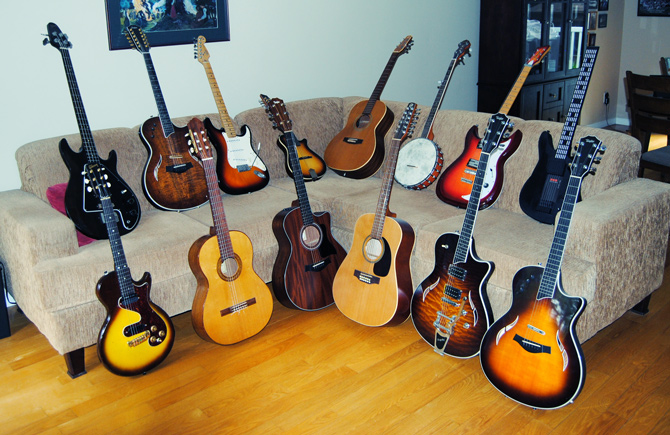In the 60s, when I was learning to play the guitar, all the hype was about three British guitarists: Eric Clapton, Jeff Beck and Jimmy Page. All three went on to have spectacular careers and they all came up playing the blues, all three of them at various times with the rock group The Yardbirds. Listening to them, I was introduced to the electric “Chicago” blues music of Muddy Waters, Howlin’ Wolf and Sonny Boy Williamson but Clapton’s great love of Robert Johnson’s music lead me south to the Mississippi delta, where a different brand of blues was being played by very different musicians.
I wasn’t ready for what I discovered – a world of obscure men (and a few women) who had picked up a guitar, bashed it mercilessly and shouted out their discontent for all the world to hear. It was “adult” music – none of that “She loves you, yeah, yeah, yeah.” It was “Goin’ down to Eli’s / Get my pistol out of pawn / When I got home / My woman was gone”; it was “Early this morning / When you knocked upon my door / I said “Hello Satan / I believe it’s time to go.” I immersed myself in their dark music, repetitive and hypnotic. What it was that captivated me so is difficult to express – if I had to choose a word, I would say “soul”, a simple and raw expression of the human condition.
These men were by no means “professional” musicians – they played every which way you could imagine, with glass bottlenecks (slides), on metal or cigar box guitars, using outlandish tunings. They were solo acoustic musicians, which was very appealing to me. I wanted to play like them – I loved the minimalism, I loved the abandon with which they played and sang, I loved the names: Sleepy John Estes, Pinetop Perkins, Peetie Wheatstraw (The Devil’s Son-in-Law).
One of the delta bluesmen who impressed me the most was Bukka White. Booker T. Washington “Bukka” White (1909-1977) had a wonderful plaintive voice and played a National steel guitar with a slide, the guitar tuned to an odd open E minor tuning. He is famous for many songs, including “Shake ‘Em On Down”, “Fixin’ To Die” and “Parchman Farm Blues” (White was convicted of a shooting incident and was sentenced in 1937 to the notoriously harsh Parchman Farm prison in rural Mississippi). The first piece I play here is my version of White’s “Fixin’ To Die.”
Again through Eric Clapton, who recorded “I’m So Glad” with his rock group Cream, I started listening to Skip James’ music. Nehemiah Curtis “Skip” James (1902-1969), like Bukka White, played in an open E minor tuning, which both men probably picked up from Henry Stuckey (1897-1966). Stuckey is said to have learned the tuning from Bahamian soldiers while serving in France during World War I.
James is also credited with “Cypress Grove Blues” which I play here, although my version is closer to Doc Watson’s definitive recording of the song. In the picture to the right, Mississippi John Hurt looks on as Skip James plays. My style of finger picking which is featured here owes a lot to Mississippi John’s playing.
The blues is not all gloom and doom and an important part is spiritual in nature. The third piece I play is the Reverend Robert Wilkins’ “Prodigal Son”, an exquisite retelling of the biblical parable. Reverend Robert Wilkins (1896-1987) is of Cherokee descent and was very popular during the 60s folk revival.
All these great bluesmen died in my lifetime, many when I was just a young man. Most people were as untroubled by their loss as they had been unaware of their presence. Their style of playing is now relegated to the past but I urge everyone to go to YouTube and listen to these greats of the 20th century.
